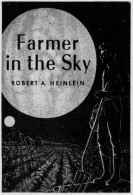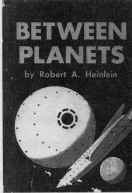Read Grumbles from the Grave Online
Authors: Robert A. Heinlein,Virginia Heinlein
Tags: #Authors; American - 20th century - Correspondence, #Correspondence, #Literary Collections, #Letters, #Heinlein; Robert A - Correspondence, #Science Fiction & Fantasy, #20th century, #Authors; American, #General, #Language Arts & Disciplines, #Science Fiction, #American, #Literary Criticism, #Science fiction - Authorship, #Biography & Autobiography, #Authorship
Grumbles from the Grave (12 page)
On the other hand, it is fairly evident that you feel that the story is just about as good now as it was before. I am sorry to say that I don't think so; maybe it's good but it ain't a Heinlein story; it's been denaturized, had its teeth pulled. But I am very reluctant to go against your advice. I think it will damage my reputation and I
know
that it includes ideas of which I violently disapprove. What do you think, Lurton? Lay it on the line.
FARMER IN THE SKY

(59)
Heinlein wrote
Farmer in the Sky
for Scribner's in 1949 during the hold-ups of filming "Destination Moon."
Bill Lermer, a Boy Scout, and his widowed father decide to emigrate from Earth to Ganymede. In order to be eligible, the father must marry. This story tells about Bill's adjustment to his new step-mother and stepsister, their voyage to Ganymede, and how all four work to build a farm in an inhospitable environment.
The new home is built, a farm started amid the wonderful sight of Jupiter and its other moons, lo, Europa and Callisto. Bill finds that his scouting is universal—a troop is formed in the space ship
Mayflower,
continued on Ganymede, amid many adventures. Bill and his family learn survival.
September 8, 1949: Robert A. Heinlein to Lurton Blassingame
I am up to page 150 in the first draft of my current story ["Farmer in the Sky"], intended for
Boys' Life
and for juvenile book, and should have this draft finished in ten days. It will probably take another month to shape it up into a satisfactory serial version and book-length version.
September 24, 1949: Robert A. Heinlein to Lurton Blassingame
The first draft of the
Boys' Life
and juvenile trade book job is finished, but the motion picture [
Destination Moon
] has developed daily crises which will probably continue until the shooting is over, about the end of November. As there is a long, tedious job of cutting to do to turn the book into a 20,000-word serial, I don't know when I will be sending in the manuscript. You may tell Crump [editor of
Boys' Life
] if you like, that the story is finished, but it may be a month or six weeks until it is ready. My situation here is unclear; my contract is up next week, the movie not yet shot, and myself unwilling to extend the contract on its present terms. We'll see.
Editor's Note: Robert had done the script for
Destination Moon
with Rip Van Ronkel in Hollywood in 1948. George Pal purchased the script, and Robert was to do technical direction on it.
The normal delays ensued. We arrived in Hollywood in early June 1949— shooting was supposed to begin soon thereafter. However, with rewrites, preproduction, and all the things that go on in Hollywood, actual shooting did not start until around October or November.
While waiting for the film production to begin, Robert wrote
Farmer in the Sky
.
November 20, 1949: Robert A. Heinlein to Lurton Blassingame
. . . I'm working fifteen hours a day; the book-length version of
Farmer in the Sky
is now with the typist and the serial length for
Boys' Life
is being cut—slowly, because I have so little time. I've got it down under 40,000; there will be much tedious work before I can get it down to 20,000 and probably will not finish it until after the picture is finished. I'm working seven days a week and getting six hours of sleep, and I can't speed it up beyond that.
March 6, 1950: Lurton Blassingame to Robert A. Heinlein
Boys' Life
found suspense problem. Scribner's very pleased with book.
April 24, 1950: Robert A. Heinlein to Lurton Blassingame
I am glad to hear that [
Boys' Life
editor] Crump is taking the serial [published in
Boy's Life
as "Satellite Scout"], since I need every cent I can scrape up for [house] building. Nevertheless, I would turn down his bid of $750 if I could afford to. It occurs to me, however, that, if he had me in a squeeze before. I have him in a squeeze now. He has scheduled it for the August issue; the makeup date must be staring him in the face, particularly as he is ordering a color painting for the cover from [Chesley] Bonestell.
* * *
And
please be sure to tell him
that I am certainly entitled to as much time to make up my mind whether or not I like his offer as he is to make up his mind whether or not he likes a story that he ordered from me in the first place. And tell him that I am proud, mean, stiff-necked, and that you doubt very much if you can get me to accept a lowered word rate, since I have been known in the past to pass up sales rather than take a cut.
Don't quite let the sale get away from you—but if you can get him on the hook and keep him there, we may be able to squeeze a couple of hundred dollars' worth of blood out of this stone. I don't care whether he gets sore or not; this is my swan song with Crump; sales to him are not worth the trouble and worry.
Don't get yourself in bad with him; blame it all on me.
Even if you have cashed the check already, I hope you will call him up and twist his arm a bit.
April 21, 1951: Robert A. Heinlein to Lurton Blassingame
. . . The transformation from
Farmer in the Sky
to "Satellite Scout" [the
Boys' Life
version] took
five
drafts and consumed most of six weeks . . . whereupon I was left in suspense while [Crump] made up his mind whether or not he liked my condensation.
BETWEEN PLANETS

(60)
Between Planets
was given a working title of
The Rolling Stones.
Heinlein soon after used
The Rolling Stones
as the title for another book. Art by Clifford Geary. Scribner's, 1951.
Don's parents suddenly order him to join them on Mars, bringing with him an odd, plastic ring of no apparent value. He leaves his school on Earth for the space station where he's to catch his ship. He meets and befriends a Venus "dragon," Sir Isaac Newton. But his ship is intercepted by Venus, no longer willing to be a mere property of Earth. Willy-nilly, Don is shipped to Venus.
There he finds work washing dishes. Several attempts are made to steal the ring. Then Earth armed forces land and ravage the town. Don joins the Venus army. Much later, he is ordered to report—to Sir Isaac. The dragon needs the ring, which contains the clue to a scientific discovery made secretly on Earth. With it, they can build an ultrafast ship and weapons to force Earth to relinquish control of the planets. Don gets to Mars on that ship—a hero!
January 18, 1951: Robert A. Heinlein to Lurton Blassingame
I am 14,000 words into the new boys' book [
Between Planets
] and the villains are way ahead. The first part always goes slowly; I have to get acquainted with the characters.
March 15, 1951: Robert A. Heinlein to Lurton Blassingame
I've just answered a nite letter from Miss Dalgliesh asking for a synopsis of
Between Planets
(formerly
The Rolling Stones
). [
The Rolling Stones
was a working title, later used for another book.] She wants the finished manuscript by the first—I can't make it, by at least a week, but I am pushing night and day.
March 17, 1951: Robert A. Heinlein to Lurton Blassingame
Between Planets
is rolling nicely; I expect to finish it by a week from today, or even sooner. However, the necessity of smooth-typing it will keep me from sending it on earlier than about the first week in April. I have told Miss Dalgliesh.
April 1, 1951: Robert A. Heinlein to Lurton Blassingame
Herewith two copies of
Between Planets.
In this same mail I have sent Miss Dalgliesh an airmail postcard telling her that the ms. will arrive in New York at the same time she receives the card (or should). Since they are so anxious to have it at the earliest possible date, will you please send the original over to her at once?
May 31, 1951: Lurton Blassingame to Robert A. Heinlein
Word from
Blue Book
taking
Between Planets,
paying $1,000. Scribner will publish about 1 November, allowing
Blue Book
to schedule story for September or October issue.
June 3, 1951: Robert A. Heinlein to Lurton Blassingame
Good news indeed about the sale of
Between Planets
to
Blue Book.
Please tell Kennicott [Donald Kennicott, editor of
Blue Book,
who knew nothing of science fiction except H. G. Wells's title] that there is no resemblance at all between Wells's
War of the Worlds
and my
Between Planets
—also that he should read Wells's book; it's a dilly. The move-overs should resemble in appearance the mythological fauns or satyrs, the "goat-men," but should avoid too close a resemblance, i.e., avoid terrestrial musculature, articulation, and physiognomy, both of goats and men. Faunus veneris is a biped, horned, and smaller than a man, but its appearance merely suggests the faun of Greek mythology. It is not actually related to any earthian life form; there is plenty of elbow room for the artist to use his imagination.
June 28, 1951: Lurton Blassingame to Robert A. Heinlein (telegram)
Scribner's proofs on their way airmail special delivery.
THE ROLLING STONES

(64)
Heinlein tried to make
The Rolling Stones
wholesome, but Dalgliesh saw some Freudian connotations in Heinlein's creation of "Flat Cats."
Castor and Pollux Stone, seventeen-year-old twins, go into space with their unusual family in a secondhand spaceship, called
The Rolling Stone.
They take along a cargo of battered bicycles to trade to settlers on Mars.
Grandmother Hazel and their father, Roger Stone, support the project by writing episodes for The
Scourge of the Spaceways,
one of whose characters is the Galactic Overlord. Three episodes a week is their normal output.
The twins buy a Martian flat cat, Fuzzy Britches, a creature most people enjoy petting. In transit they find that flat cats multiply with extreme rapidity, given sufficient food. They are forced to put the creatures into deep freeze.
In the asteroid belt, the twins create a demand for the flat cats, now thawed, selling them to lonely miners.
December 1, 1951: Robert A. Heinlein to Lurton Blassingame
The boys' novel
Rolling Stones
is about a quarter finished, smooth draft—and an unsatisfactory story line thereafter. The trouble is that I am trying to do domestic comedy this time with nothing much in the way of revolutions and blood—and I find comedy harder to write. Oh, I can keep up wisecracking dialog all too easily, but the characters have to do something too, something important. With space warfare and intrigue ruled out by the nature of the story I find that a problem. Story centers around twin boys and their eccentric family. Family goes to asteroids in family spaceship, get into various sorts of trouble, get out again.
January 5, 1952: Robert A. Heinlein to Lurton Blassingame
The new boys' novel,
The Rolling Stones,
is rolling along. I am hard at work seven days a week.
January 15, 1952: Robert A. Heinlein to Lurton Blassingame
